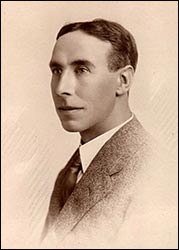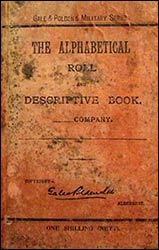|
|||||||||||||||
| Article by Pat Jenkins, 2013 |
|||||||||||||||
|
Rushden's 'Gurkhas'
|
|||||||||||||||
|
Defending Rushden From The Hun
|
|||||||||||||||
|
|
|||||||||||||||
They eventually became the Royal Defence Corps. They wore plain clothes with a brassard "G.R." on their sleeve.
In 1915, Earl Spencer, Lord Lieutenant of the County, sent out notices around the County, encouraging the setting up of Local Defence Volunteers. Possibly this order was taken up by William James Reynolds, a teacher at Newton Road School. The Muster Book of Rushden volunteers still exists and very interesting it is. It lists, in alphabetical order, men and boys, with their ages, addresses and the reasons why they were exempt from Military Service. Apparently they called themselves "The Rushden Gurkhas".
There are many 16 year olds in the book, possibly this was the youngest age allowed. The oldest men are H. Savage of Ebenezer Terrace, aged 54 and a shoe hand, and Fred Shaw, also aged 54, of Queen Street, exempted on grounds of age. The book mysteriously says "age - not regulation standard". There are 204 names altogether, from all parts of the town. We may, or may not, feel sorry for Percy Glenister, Don Chamberlain, Jack Ingram and Harry Joyce who were exempted from service on the grounds of bad teeth. A. J. Clark had an invalid mother dependent on him and Albert Griffiths and Percy Gates were not big or broad enough. Shoe manufacturers Alfred Sargent, who built and occupied our house in Newton Road, is there, also Horace Wright, who also lived in our house. This book is a fascinating survivor of a past time and another glimpse into the history of Rushden. Pat Jenkins Our thanks to Stella Reynolds and family for the gift of the book and the photo of J.W.Reynolds. |
|||||||||||||||
|
|
|||||||||||||||

